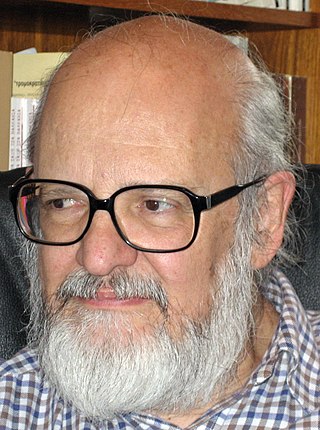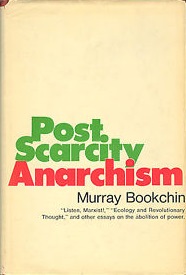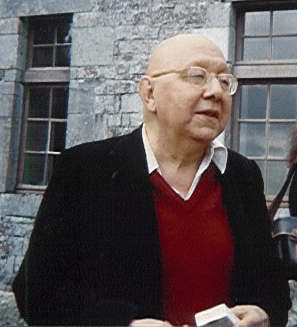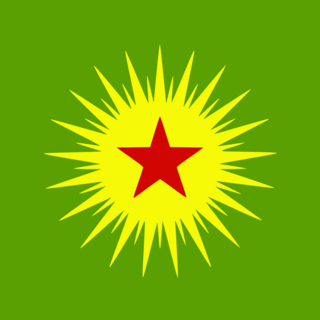Green anarchism, also known as ecological anarchism or eco-anarchism, is an anarchist school of thought that focuses on ecology and environmental issues. It is an anti-capitalist and anti-authoritarian form of radical environmentalism, which emphasises social organization, freedom and self-fulfillment.

Murray Bookchin was an American social theorist, author, orator, historian, and political philosopher. A pioneer in the environmental movement, Bookchin formulated and developed the theory of social ecology and urban planning within anarchist, libertarian socialist, and ecological thought. He was the author of two dozen books covering topics in politics, philosophy, history, urban affairs, and social ecology. Among the most important were Our Synthetic Environment (1962), Post-Scarcity Anarchism (1971), The Ecology of Freedom (1982), and Urbanization Without Cities (1987). In the late 1990s, he became disenchanted with what he saw as an increasingly apolitical "lifestylism" of the contemporary anarchist movement, stopped referring to himself as an anarchist, and founded his own libertarian socialist ideology called "communalism", which seeks to reconcile and expand Marxist, syndicalist, and anarchist thought.

Uneconomic growth is economic growth that reflects or creates a decline in the quality of life. The concept is used in human development theory, welfare theory, and ecological economics. It is usually attributed to ecological economist Herman Daly, though other theorists may also be credited for the incipient idea, According to Daly, "uneconomic growth occurs when increases in production come at an expense in resources and well-being that is worth more than the items made." The cost, or decline in well-being, associated with extended economic growth is argued to arise as a result of "the social and environmental sacrifices made necessary by that growing encroachment on the eco-system."
An ecological or environmental crises occurs when changes to the environment of a species or population destabilizes its continued survival. Some of the important causes include:
The Institute for Social Ecology (ISE) is an educational institution in Plainfield, Vermont dedicated to the study of social ecology, "an interdisciplinary field drawing on philosophy, political and social theory, anthropology, history, economics, the natural sciences, and feminism." Founded in 1974, ISE offered some of the first courses in the country on urbanism and ecology, radical technology, ecology and feminism, activist art and community; it "won an international reputation" for its courses in social theory, eco-philosophy and alternative technologies.
New Politics is an independent socialist journal founded in 1961 and still published in the United States today. While it is inclusive of articles from a variety of left-of-center positions, the publication is historically associated with a "Neither Washington Nor Moscow!" Third Camp, democratic Marxist perspective, placing it typically to the left of the social democratic views in the journal Dissent.

Janet Biehl is an American author, copyeditor, translator, and artist. She authored several books and articles associated with social ecology, the body of ideas developed and publicized by Murray Bookchin. Formerly an advocate of his antistatist political program, she broke with it publicly in 2011 and now identifies as a progressive Democrat.

Takis Fotopoulos is a Greek political philosopher, economist and writer who founded the Inclusive Democracy movement, aiming at a synthesis of classical democracy with libertarian socialism and the radical currents in the new social movements. He is an academic, and has written many books and over 900 articles,. He is the editor of The International Journal of Inclusive Democracy and is the author of Towards An Inclusive Democracy (1997) in which the foundations of the Inclusive Democracy project were set. His latest book is The New World Order in Action: Volume 1: Globalization, the Brexit Revolution and the "Left"- Towards a Democratic Community of Sovereign Nations. Fotopoulos is Greek and lives in London.

Environmental philosophy is a branch of philosophy that is concerned with the natural environment and humans' place within it. It asks crucial questions about human environmental relations such as "What do we mean when we talk about nature?" "What is the value of the natural, that is non-human environment to us, or in itself?" "How should we respond to environmental challenges such as environmental degradation, pollution and climate change?" "How can we best understand the relationship between the natural world and human technology and development?" and "What is our place in the natural world?" Environmental philosophy includes environmental ethics, environmental aesthetics, ecofeminism, environmental hermeneutics, and environmental theology. Some of the main areas of interest for environmental philosophers are:

Steven Best is an American philosopher, writer, speaker and activist. His concerns include animal rights, species extinction, human overpopulation, ecological crisis, biotechnology, liberation politics, terrorism, mass media and culture, globalization, and capitalist domination. He is Associate Professor of Humanities and Philosophy at the University of Texas at El Paso. He has published 13 books and over 200 articles and reviews.
Articles in social and political philosophy include:

Post-Scarcity Anarchism is a collection of essays by Murray Bookchin, first published in 1971 by Ramparts Press. In it, Bookchin outlines the possible form anarchism might take under conditions of post-scarcity. One of Bookchin's major works, its author's radical thesis provoked controversy for being utopian in its faith in the liberatory potential of technology.

Counterrevolution and Revolt is a 1972 book by the philosopher Herbert Marcuse.
Dimitrios I. Roussopoulos is a Canadian political activist and publisher.
Marcelo Lopes de Souza is a professor of socio-spatial development and political ecology at the Department of Geography of the Federal University of Rio de Janeiro, where he co-ordinates the Núcleo de Pesquisas sobre Desenvolvimento Sócio-Espacial/NuPeD. He received the first prize of the German Society of Research on Latin America in 1994 for his PhD thesis about the urban question in Brazil, and the Jabuti Award for his book O desafio metropolitano in 2001. His book Fobópole: O medo generalizado e a militarização da questão urbana, published in 2008, was nominated for the Jabuti Award in 2009.
Eco-socialism is an ideology merging aspects of socialism with that of green politics, ecology and alter-globalization or anti-globalization. Eco-socialists generally believe that the expansion of the capitalist system is the cause of social exclusion, poverty, war and environmental degradation through globalization and imperialism, under the supervision of repressive states and transnational structures.

Cornelius Castoriadis was a Greek-French philosopher, social critic, economist, psychoanalyst, author of The Imaginary Institution of Society, and co-founder of the Socialisme ou Barbarie group.

The Ecology of Freedom: The Emergence and Dissolution of Hierarchy is a 1982 book by the American libertarian socialist and ecologist Murray Bookchin, in which the author describes his concept of social ecology, the idea that ecological problems are caused by human social problems and can be solved only by reorganizing society along ecological and ethical lines. The book is considered Bookchin's magnum opus, but it has also been criticized as utopian.

Democratic confederalism, also known as Kurdish communalism or Apoism, is a political concept theorized by Kurdistan Workers Party (PKK) leader Abdullah Öcalan about a system of democratic self-organization with the features of a confederation based on the principles of autonomy, direct democracy, political ecology, feminism, multiculturalism, self-defense, self-governance and elements of a cooperative economy. Influenced by social ecology, libertarian municipalism, Middle Eastern history and general state theory, Öcalan presents the concept as a political solution to Kurdish national aspirations, as well as other fundamental problems in countries in the region deeply rooted in class society, and as a route to freedom and democratization for people around the world.
This is a list of works by Murray Bookchin (1921–2006). For a more complete list, please see the Bookchin bibliography compiled by Janet Biehl.










